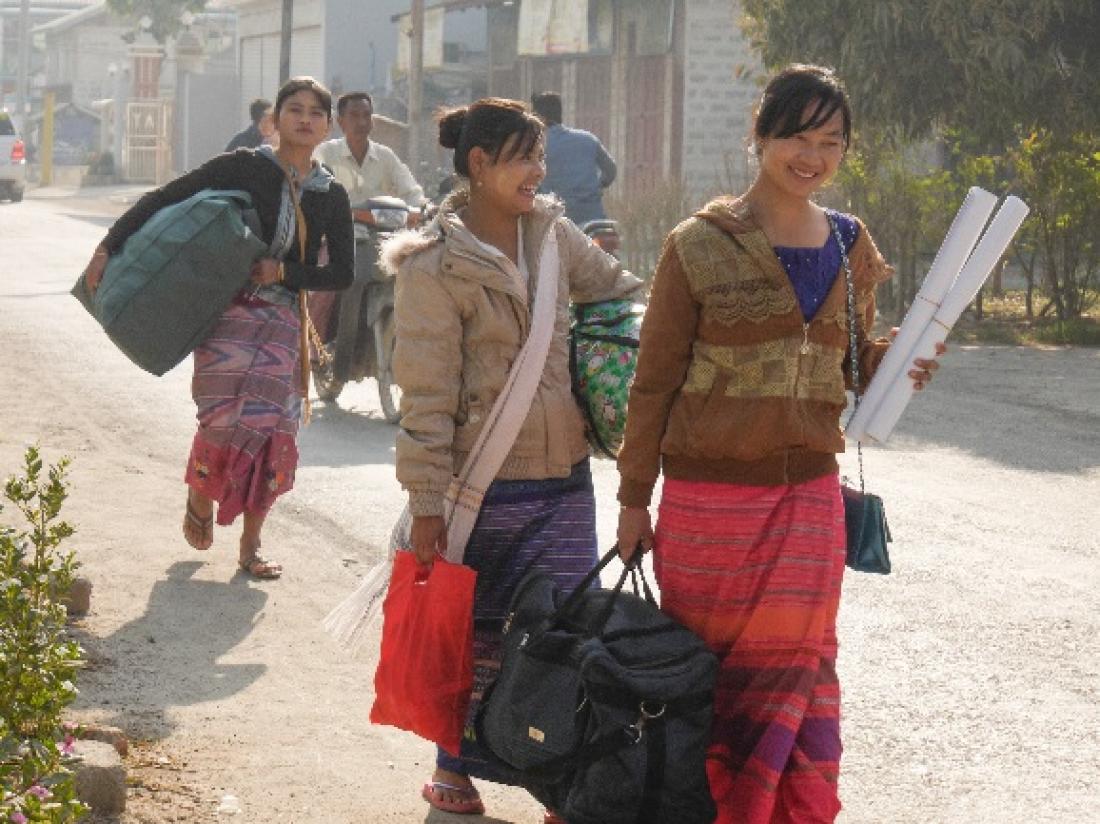Intha women on the move for work in Burma’s Nyaung Shwe town, Shan state.
Burma, one of Asia’s least developed countries, has undergone a dramatic series of political and economic shifts since the end of military rule in 2011. The country has recently introduced a range of labour market reforms as it attempts to tackle poverty and spur growth by expanding its manufacturing sector and attracting foreign investment.
Reforms are long overdue for Burmese workers. For decades, the country was known for its human rights abuses, including forced labour and human trafficking. The reform process, intended to pave the way for unions, new minimum wage rules and social security measures, has been slow and contentious. But two years after the government set up a joint committee to review minimum wages, a new minimum wage – set at K3600 (US$2.80) – came into effect on September 1, 2015.
New research on labour market reforms led by Burma’s Centre for Economic and Social Development (CESD), aims to help the country navigate its difficult transition toward greater prosperity and openness. A key challenge will be to balance improvements in wages and working conditions against industry’s need to retain a competitive edge.
According to Zaw Oo, executive director of CESD, Burma’s economy can only avoid a low-wage trap by enhancing skills and productivity hand-in-hand with better working conditions. “We are trying to ensure workers and employers have a more constructive relationship and work with government to improve skills, productivity and management practices so that we are not bound to low-end manufacturing in the textile and garment sector, but can move up the value chain to more advanced production.”
Working with representatives from government, civil society and the private sector, researchers will survey employers and employees in labour-intensive industries. This will provide a foundation for analysing the needs and drivers behind productivity, social security and wages. The team is also reviewing labour-related laws and regulations, and available labour market data. The project aims to provide Burma’s decision-makers with evidence to inform ongoing reforms. It also hopes to strengthen Burmese capacities, giving national researchers international exposure and providing training to help government officials apply evidence in weighing policy options.
Child labour remains rampant in Burma. According to the 2014 Maplecroft Child Labour Index, Burma ranked third out of 197 countries for the prevalence of child labour. Poverty and the need to contribute to family income force children as young as 12 into the workforce, and only half of all students progress to secondary school. Not only does child labour violate children’s rights and undermine the development of human capital, it also risks the reputation of Burmese industries within global supply chains.
Business for Social Responsibility (BSR), a global non-profit network, has found that international garment sector buyers in other countries can play a significant role in eradicating child labour. Given that Burma’s garment sector is small but growing, the country has a unique opportunity to address the challenge of eradicating child labour head-on, rather than face possible boycotts down the road. To date, BSR Hong Kong has convened a group of responsible brands seeking to tackle child labour through the Myanmar Responsible Sourcing Working Group.
With support from Canada’s International Development Research Centre, BSR is now conducting research that will strengthen the search for collaborative solutions. In 2016, it will develop and share a research brief for Burmese and international audiences and a report mapping organisations that can help eradicate child labour. The brief will identify next steps for tackling the challenge at the factory level and among civil society groups, helping them advocate for measures to keep Burma’s children in school.
For further information contact:
Zaw Oo
Centre for Economic and Social Development, Burma
E-mail: [email protected]
Jeremy Prepscius
Business for Social Responsibility, Hong Kong
E-mail: [email protected]
International Development Research Centre, Canada
E-mail: [email protected]



